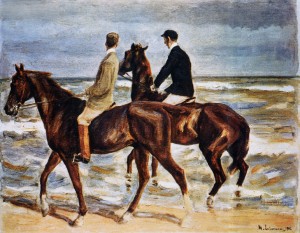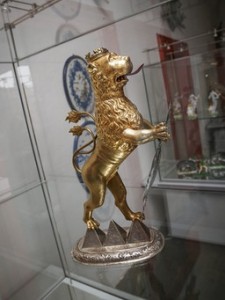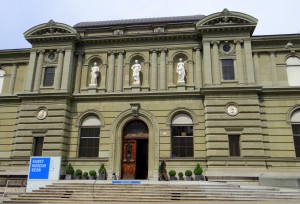While we have tried to read the tea leaves and predict what the Kunstmuseum Bern will do on or before November 26 (the deadline to accept or reject the appointment as Cornelius Gurlitt’s heir)—and what others might do if the museum turns it down, less prominent has been the validity of the will in question itself. It is far from a forgone conclusion, however, that his last-minute will would hold up under scrutiny. The circumstances alone—an elderly person, under enormous international scrutiny, placed under a guardianship—beg the question.
Expert Opinion Casts Doubt on Gurlitt’s Testamentary Capacity to Make the Will that Names the Kunstmuseum Bern as Heir
Topics: Schwabinger Kunstfund, Hildebrand Gurlitt, Cornelius Gurlitt, Nazi-looted art, Gurlitt Collection, Restitution, testamentary capacity, World War II, Kunstmuseum Bern, Münchner Kunstfund
If the Kunstmuseum Bern Says No: Gurlitt Heirs Discuss Plans if They Inherit Schwabing Trove
As the November 26, 2014 deadline approaches by which the Kunstmuseum Bern must accept or reject the appointment as Cornelius Gurlitt’s heir and the bequest of the paintings seized by the Bavarian government on suspicions of Nazi-looting concerns (as well as those in other countries that were not seized), most observers expect the museum to accept the appointment, albeit perhaps with some side agreement with the German government. But what if the museum says no? Reports floated this week of what Gurlitt’s heirs-at-law might do in that event.
Topics: Schwabinger Kunstfund, Hildebrand Gurlitt, Cornelius Gurlitt, Monopol, SZ, Nazi-looted art, Gurlitt Collection, Entartete Kunst, Willbald Gurlitt, Restitution, Bavaria, World War II, Degenerate Art Action, degenerate art, beschlagnahmte Kunst, Kunstmuseum Bern, Münchner Kunstfund
Reports that Gurlitt Task Force May Not Meet Deadline—What Happens Then?
There were reports over the weekend that the Gurlitt Task Force, currently reviewing the provenance of more than 900 of the 1,280 works of art seized from Cornelius Gurlitt’s apartment, may not complete that review within the year reportedly set out in the agreement between Bavaria and Gurlitt before he died. There is still confusion about whether the Task Force was indeed foreshadowing a missed deadline (the agreement was in April, so the notion that the review would continue “into 2015” is not necessarily inconsistent with completing its task within one year), but assuming it was, what happens then?
Topics: Focus, Schwabinger Kunstfund, Hildebrand Gurlitt, Cornelius Gurlitt, Gurlitt Task Force, Nazi-looted art, Gurlitt Collection, Foreign Sovereign Immunities Act, Commission for Looted Art in Europe, Entartete Kunst, Anne Webber, Restitution, Der Spiegel, World War II, degenerate art, Kunstmuseum Bern, verschollene Kunst, Münchner Kunstfund
One Year After Gurlitt Revelation, No One is Pleased
It has now been one year since Focus magazine in Germany broke the Cornelius Gurlitt story on November 3, 2013. Looking back at the history of the case as it has unfolded since then, the overriding theme has been difficulty in obtaining accurate information about the current state of affairs. The appointed Task Force has made only two recommendations, and the status of the bequest to the Kunstmuseum Bern is still up in the air. And nobody seems remotely pleased.
Topics: Focus, Schwabinger Kunstfund, Hildebrand Gurlitt, Cornelius Gurlitt, Drefsden, Gurlitt Task Force, Nazi-looted art, Gurlitt Collection, Foreign Sovereign Immunities Act, Lex Gurlitt, Entartete Kunst, Salzburg, Bundesrat, Restitution, Der Spiegel, World War II, Foreign Sovereign Immunities, Switzerland, degenerate art, Kunstmuseum Bern, verschollene Kunst, Münchner Kunstfund, Ronald Lauder
Museums in Bamberg and Karlsruhe Recognize a Sale Under Duress For What it Was, Seek to Do Right Thing
Restitution policy at the federal and state level in Germany in recent months seems to have taken a certain direction that has been cause for criticism. Whether it is the recent decisions by the Limbach Commission that ignore longstanding law about sales under duress, the odd decision by the Federal Republic of Germany to resist a lawsuit over the Max Liebermann painting found in Cornelius Gurlitt’s apartment that the Gurlitt Task Force has already recommended be restituted, or the resistance to the claims by the Mendelssohn-Bartholdy heirs to Picasso’s Madame Soler, the trend has been towards obstruction and resistance rather than transparency and reconciliation. Notwithstanding the recent announcement of the Center for Cultural Property losses (the Deutsches Zentrum für Kulturgutverluste about which the jury is still out), this is cause for concern.
Topics: Katharina Siefert, Schwabinger Kunstfund, Cornelius Gurlitt, Karlsruhe Kunsthalle, Freien Kunst- und Ritterschießen, Badische Landesmuseum, Max Liebermann, Bamberg, Gurlitt Collection, Woman in a Theatre Balcony, Lothar Franz von Schönborn, Madame Soler, Schönborn’sche Löwenpokal, Heinrich and Emma Budge, Reich Ministry for Art- and Museum Objects, Schönborn Lion Cup, Restitution, Upper Franconia, Mendelssohn-Bartholdy, Mannheim, Karlsruhe, Free and Knightly Art of Shooting, World War II, Elector-Bishop, Kurfürst, Reichserziehungsministerium für Kunst- und Museums, Kurt Martin, www.lostart.de, Center for Cultural Property, Museums, Fürst-Bischof, Picasso, Federal Republic of Germany, Deutsches Zentrum für Kulturgutverluste, Limbach Commission, Oberfranken, Prince-Elector of Mainz
Toren Amends Complaint Against Bavaria Over Liebermann Seized from Gurlitt, Spotlights Task Force Recommendation of Restitution in Support of Bailment Theory
Two weeks ago, the Federal Republic of Germany and Bavaria moved to dismiss the restitution claims brought by David Toren over ownership of Two Riders on the Beach (Zwei Ritter am Strand) by the German painter Max Liebermann. Toren’s uncle David Friedmann owned the painting in Breslau before he was targeted for his collection and it was stolen. Toren had not seen it since adolescence. The painting is further notable for two (related) reasons: it is among the 1,280 works of art found in Cornelius Gurlitt’s apartment in 2012, and it is one of only two that the Gurlitt Task Force has recommended be restituted (to Toren). As we noted at the time of the motion, Germany’s tactics seemed odd; Bavaria has committed to complying with the Task Force’s recommendations, and contesting this case seems to make little sense. The likeliest reason, in our view, is to try to make some jurisdictional law that will weaken other potential claimants to the Gurlitt trove.
Topics: Schwabinger Kunstfund, Hildebrand Gurlitt, Cornelius Gurlitt, Breslau, Max Liebermann, Germany, Silesia, Gurlitt Collection, Foreign Sovereign Immunities Act, bailment, Entartete Kunst, FSIA, Restitution, Bavaria, David Toren, Zwei Ritter am Strand, Free State of Bavaria, 28 U.S.C. § 1605(a)(2), Looted Art, World War II, Foreign Sovereign Immunities, Altmann v. Republic of Austria, Freistaat Bayern, Kunstmuseum Bern, Riders on the Beach, Federal Republic of Germany, Raubkunst, David Friedmann, Münchner Kunstfund
Conflicting Reports About Possible Acceptance of Gurlitt Bequest by Kunstmuseum Bern
There have been multiple and conflict reports in the last 48 hours about whether the Kunstmuseum Bern had reached a decision to accept the inheritance from and appointment as heir by Cornelius Gurlitt. Gurlitt, who died in early May shortly after reaching an agreement with the Bavarian prosecutor concerning the 1,280 works of art seized from his apartment on suspicion of Nazi-looting connections, unexpectedly named the Swiss museum as the sole beneficiary of his will, and as his heir and representative. Just last week, the news was that the Kunstmuseum had resolved to decide by late November, no later than six months after being advised of Gurlitt’s bequest.
Topics: Reuters, Schwabinger Kunstfund, Hildebrand Gurlitt, Cornelius Gurlitt, Nazi-looted art, Gurlitt Collection, Tages Anzeiger, Munich, Christoph Schäublin, Restitution, Bavaria, Ruth Gilgen Hamisultane, World War II, Swiss, Austria, Sonntagszeitung, Kunstmuseum Bern, Berner Zeitung, Zürich, Nazi Raubkunst, Münchner Kunstfund
Bavaria and Germany Move to Dismiss Gurlitt Litigation, But Raise Questions About Why They Are Resisting a Lawsuit Over Painting that Task Force Recommended They Restitute to David Toren
To date, only one lawsuit has been filed in the United States related to the seizure from Cornelius Gurlitt’s apartment of some 1,280 works of art, a story that broke a year ago with the concern about the objects’ Nazi-looting connections via his father Hildebrand Gurlitt (the view here last winter was that the longer Germany failed to address the situation comprehensively, the more likely such U.S. litigation became). That lawsuit, brought by David Toren, seeks the return of Two Riders on the Beach (Zwei Ritter am Strand), by Max Liebermann. Germany and Bavaria moved to dismiss the case yesterday, which is particularly puzzling given that among the very few determinations made by the Gurlitt Task Force (in August), it is that the Liebermann should be returned. The cynical view is that they are looking to forestall future claims, but it is past time for the painting to be returned.
Topics: Schwabinger Kunstfund, Hildebrand Gurlitt, Cornelius Gurlitt, Breslau, Max Liebermann, Germany, Silesia, Gurlitt Collection, Foreign Sovereign Immunities Act, bailment, Entartete Kunst, FSIA, Restitution, Bavaria, David Toren, Zwei Ritter am Meer, Free State of Bavaria, 28 U.S.C. § 1605(a)(2), Looted Art, World War II, Altmann v. Republic of Austria, Freistaat Bayern, Kunstmuseum Bern, Riders on the Beach, Federal Republic of Germany, Raubkunst, David Friedmann, Münchner Kunstfund
Germany Announces "Center for Cultural Property Losses": Real Progress or Window Dressing?
After numerous intimations by German Minister of Culture Monika Grütters, the German federal cabinet announced on Wednesday the official formation of the German Center for Cultural Property Losses (Deutsches Zentrum Kulturgutverluste). Citing its “awareness of the special responsibility for the reworking of Nazi art theft,” the ruling CDU coalition issued this statement (my translation):
Topics: Schwabinger Kunstfund, Hildebrand Gurlitt, Cornelius Gurlitt, Deutsches Zentrum Kulturgutverluste, Germany, Minister of Culture Monika Grütters, Nazi-looted art, Gurlitt Collection, Lex Gurlitt, Koordinierungsstelle für Lost Art in Magdeburg, Magdeburg, enteignete Kunst, Gurlitt, NS Raubkunst, Restitution, Task Force, Bundesländer, Lost Art, www.lostart.de, Limbach Commission, Center for Cultural Property Losses
Kunstmuseum Bern Still Undecided About Gurlitt Inheritance as Regional Politics Loom
Almost none of the legal issues flowing from the seizure of some 1,280 works of art from Cornelius Gurlitt’s apartment in 2012, his agreement with the Bavarian prosecutor, and the ongoing review of the collection for connections to Nazi looting can be resolved until his named heir—the Kunstmuseum Bern—decides whether or not to accept that appointment. When the one-year review deadline passes (with only two public recommendations made so far), it is entirely unclear who will stand for Gurlitt’s "rights" over what is left.
Topics: Schwabinger Kunstfund, Beat Giauque, Cornelius Gurlitt, Grosser Rat, Nazi-looted art, Gurlitt Collection, canton, Paul Klee, Ittigen, Trubschachen, Samuel Leuenberger, Kunstmuseum Bern, Gurlitt Erbe, Museums, Berner Zeitung, Münchner Kunstfund, Kanton Bern





